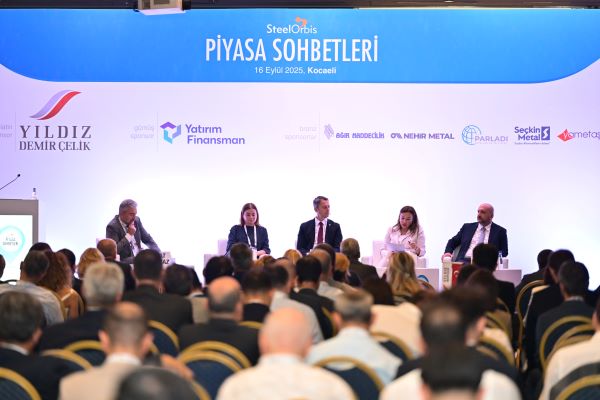On Tuesday, September 16, the SteelOrbis Market Talks meeting, held at the Wellborn Luxury Hotel in Kocaeli with over 600 participants and sponsored by Turkish steel producer Yıldız Demir Çelik, addressed such critical topics as the impact of high interest rates on trade and investment, the pressure created by global oversupply, protectionist measures, and the Inward Processing Regime in Turkey. The panel reached a consensus that 2025 will be challenging, but that a recovery is highly likely in 2026. Other sponsors of the meeting were Yatırım Finansman, Ağır Haddecilik, Nehir Metal, Parladı Metal, Seçkin Metal, and Yametaş.
Following the opening speech by Murat Eryılmaz, general manager of SteelOrbis, Vedat Acar, sales director of Yıldız Demir Çelik, stated that Turkey's steel consumption is expected to decline by 1.7 percent this year, but exports are projected to increase by 23.5 percent during the same period.

High interest rates challenge the sector
In the first part of the panel moderated by Murat Eryılmaz, the impact of interest rates on the steel sector was discussed. Yıldız Demir Çelik’s export sales manager Hakan Bozoğlu explained that rising interest rates in Europe and the US have increased credit costs, making it difficult for consumers to purchase steel-intensive products such as houses, cars, or home appliances. In Turkey, he added, high inflation and currency pressures were already straining producers, and rising interest rates have further slowed industrial investments.
Parladı Metal board member Bahar Parladı said that high interest rates particularly complicate stock management in steel service centers, adding, “Holding inventory no longer generates profit; instead, it increases the financing burden.” Kalibre Boru CFO Zeynep Annak emphasized that banks are becoming increasingly selective in lending, giving companies with stronger balance sheets an advantage while weaker ones struggle to survive.
ONT Çelik Ticaret A.Ş. managing partner Orçun Günay stated that financing costs have reached extraordinary levels within customers’ total expenses, making steel trade unsustainable. Nevertheless, he stressed that mid-term interest rate cuts are expected to bring renewed activity to the market.
Global capacity expansion continues
The second part of the panel focused on global oversupply. Bahar Parladı highlighted forecasts suggesting that global excess capacity will reach 277 million mt by 2027, adding that Turkey increased its production in 2024 despite a contraction in consumption.
Zeynep Annak underlined that oversupply is not only about tonnage but also directly tied to costs. While at first glance oversupply seems advantageous for buyers, she explained, Turkey’s higher energy, labor, and logistics costs compared to many rival countries are squeezing producers. This reduces short-term profitability, delays investments in the medium term, and increases financial risks.
Orçun Günay noted that rising capacity investments in Asia are creating major pressure on hot rolled coil, but Turkey can manage this period thanks to its agility. He also pointed out that Turkey holds an advantageous position due to its low carbon score under the EU’s Carbon Border Adjustment Mechanism (CBAM).
Meanwhile, Hakan Bozoğlu reminded participants that technological advances are slowing steel consumption while supply keeps rising, saying, “Today, there is a global oversupply of 600 million mt, and this number will grow in the coming years. This inevitably pushes countries toward protectionist policies.”
How effective is protectionism?
The third part of the panel discussed protectionist measures. Orçun Günay argued that antidumping and quota measures, which have long been implemented in the US and Europe, have not contributed to the industry. He pointed out that US steel consumption has fallen from 150 million mt to 110 million mt over 20 years, showing that such measures have not provided a lasting solution.
Bahar Parladı noted that protectionism suppresses prices and makes end-users hesitant about long-term import agreements. Still, she said, Turkey’s measures have been moderate and helped limit abuses in the sector. Zeynep Annak emphasized that protective measures should align with national strategy, stating, “Protection is necessary for high value-added products, but these measures should not put consumers in a difficult position.” Hakan Bozoğlu added that antidumping and quotas have become inevitable for Turkey; otherwise, domestic producers would be disadvantaged in global competition.
Inward Processing Regime is vital but needs oversight
The fourth part of the panel addressed the Inward Processing Regime (IPR). Hakan Bozoğlu stressed that this mechanism is indispensable for exporters to maintain competitiveness. Orçun Günay, however, warned that sudden changes in collateral requirements pose major risks, especially for small and medium-sized enterprises.
Bahar Parladı noted that stricter monitoring of IPR certificate validity periods has reduced abuses in the sector, thereby creating a more transparent market environment. Zeynep Annak cautioned that abrupt changes in collateral ratios by the ministry put pressure on exporters, saying, “When such regulations become unpredictable, companies lose the ability to plan, threatening the sustainability of exports.”
Cautious optimism for the future
The final part of the panel focused on expectations for 2025 and 2026. Zeynep Annak predicted a recovery in automotive demand, saying, “Turkey is both a sufficiently large market and flexible enough to quickly rebound positively from external shocks. If we can boost institutional trust, foreign investors’ interest will grow rapidly.” Orçun Günay suggested that global interest rate cuts will stimulate investment and lead to renewed steel demand growth in 2026. He also highlighted that reconstruction efforts in war zones and rising regional demand could create new opportunities for the industry.
Announcing that Parladı Metal will expand its service network and increase its export share with a new facility in Çerkezköy, Bahar Parladı stressed that tough times should be seen not only as a struggle for survival but also as opportunities to invest in the future. Hakan Bozoğlu concluded that global economic normalization could quickly reflect on Turkey, enabling the sector to enter 2026 in a stronger position.
After the panel, Yatırım Finansman corporate communications director Dr. Barış Esen and Bilkent University faculty member and former Central Bank of Turkey (CBRT) chief economist Prof. Dr. Hakan Kara gave a presentation addressing global economic threats expected in the near term, the impact of Turkey’s monetary policies on local industry, and financial expectations for 2026.